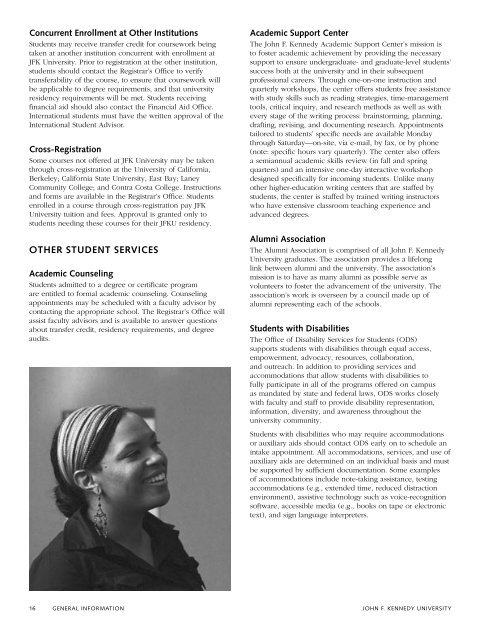J o h n F K e n n e d y U n i v e r s i t y
JFK University Catalog 2006-2007 - John F. Kennedy University
JFK University Catalog 2006-2007 - John F. Kennedy University
- No tags were found...
You also want an ePaper? Increase the reach of your titles
YUMPU automatically turns print PDFs into web optimized ePapers that Google loves.
Concurrent Enrollment at Other InstitutionsStudents may receive transfer credit for coursework beingtaken at another institution concurrent with enrollment atJFK University. Prior to registration at the other institution,students should contact the Registrar’s Office to verifytransferability of the course, to ensure that coursework willbe applicable to degree requirements, and that universityresidency requirements will be met. Students receivingfinancial aid should also contact the Financial Aid Office.International students must have the written approval of theInternational Student Advisor.Cross-RegistrationSome courses not offered at JFK University may be takenthrough cross-registration at the University of California,Berkeley; California State University, East Bay; LaneyCommunity College; and Contra Costa College. Instructionsand forms are available in the Registrar’s Office. Studentsenrolled in a course through cross-registration pay JFKUniversity tuition and fees. Approval is granted only tostudents needing these courses for their JFKU residency.OTHER STUDENT SERVICESAcademic CounselingStudents admitted to a degree or certificate programare entitled to formal academic counseling. Counselingappointments may be scheduled with a faculty advisor bycontacting the appropriate school. The Registrar’s Office willassist faculty advisors and is available to answer questionsabout transfer credit, residency requirements, and degreeaudits.Academic Support CenterThe John F. Kennedy Academic Support Center’s mission isto foster academic achievement by providing the necessarysupport to ensure undergraduate- and graduate-level students’success both at the university and in their subsequentprofessional careers. Through one-on-one instruction andquarterly workshops, the center offers students free assistancewith study skills such as reading strategies, time-managementtools, critical inquiry, and research methods as well as withevery stage of the writing process: brainstorming, planning,drafting, revising, and documenting research. Appointmentstailored to students’ specific needs are available Mondaythrough Saturday—on-site, via e-mail, by fax, or by phone(note: specific hours vary quarterly). The center also offersa semiannual academic skills review (in fall and springquarters) and an intensive one-day interactive workshopdesigned specifically for incoming students. Unlike manyother higher-education writing centers that are staffed bystudents, the center is staffed by trained writing instructorswho have extensive classroom teaching experience andadvanced degrees.Alumni AssociationThe Alumni Association is comprised of all John F. KennedyUniversity graduates. The association provides a lifelonglink between alumni and the university. The association’smission is to have as many alumni as possible serve asvolunteers to foster the advancement of the university. Theassociation’s work is overseen by a council made up ofalumni representing each of the schools.Students with DisabilitiesThe Office of Disability Services for Students (ODS)supports students with disabilities through equal access,empowerment, advocacy, resources, collaboration,and outreach. In addition to providing services andaccommodations that allow students with disabilities tofully participate in all of the programs offered on campusas mandated by state and federal laws, ODS works closelywith faculty and staff to provide disability representation,information, diversity, and awareness throughout theuniversity community.Students with disabilities who may require accommodationsor auxiliary aids should contact ODS early on to schedule anintake appointment. All accommodations, services, and use ofauxiliary aids are determined on an individual basis and mustbe supported by sufficient documentation. Some examplesof accommodations include note-taking assistance, testingaccommodations (e.g., extended time, reduced distractionenvironment), assistive technology such as voice-recognitionsoftware, accessible media (e.g., books on tape or electronictext), and sign language interpreters.16 GENERAL INFORMATIONJOHN F. KENNEDY UNIVERSITY















